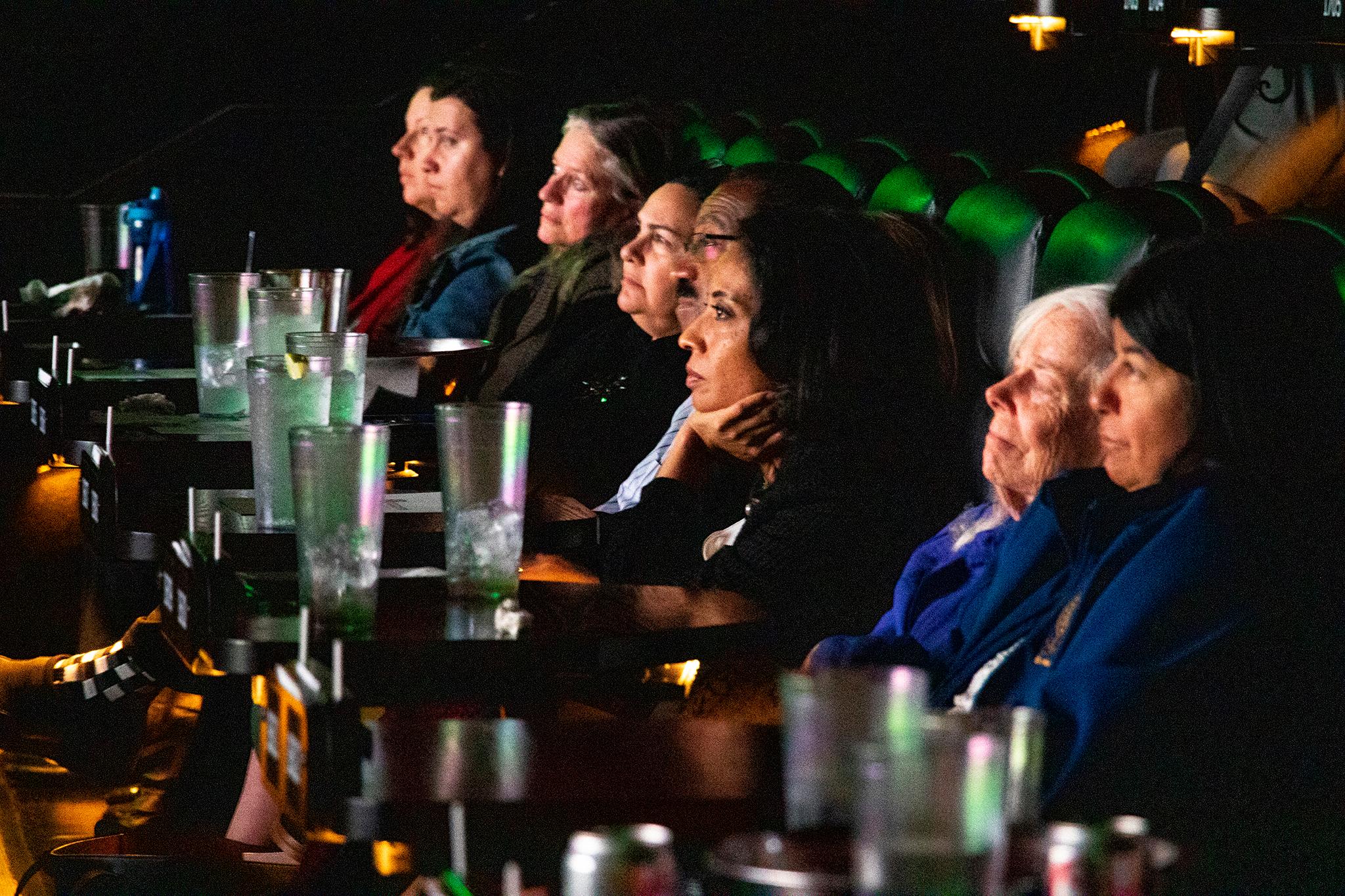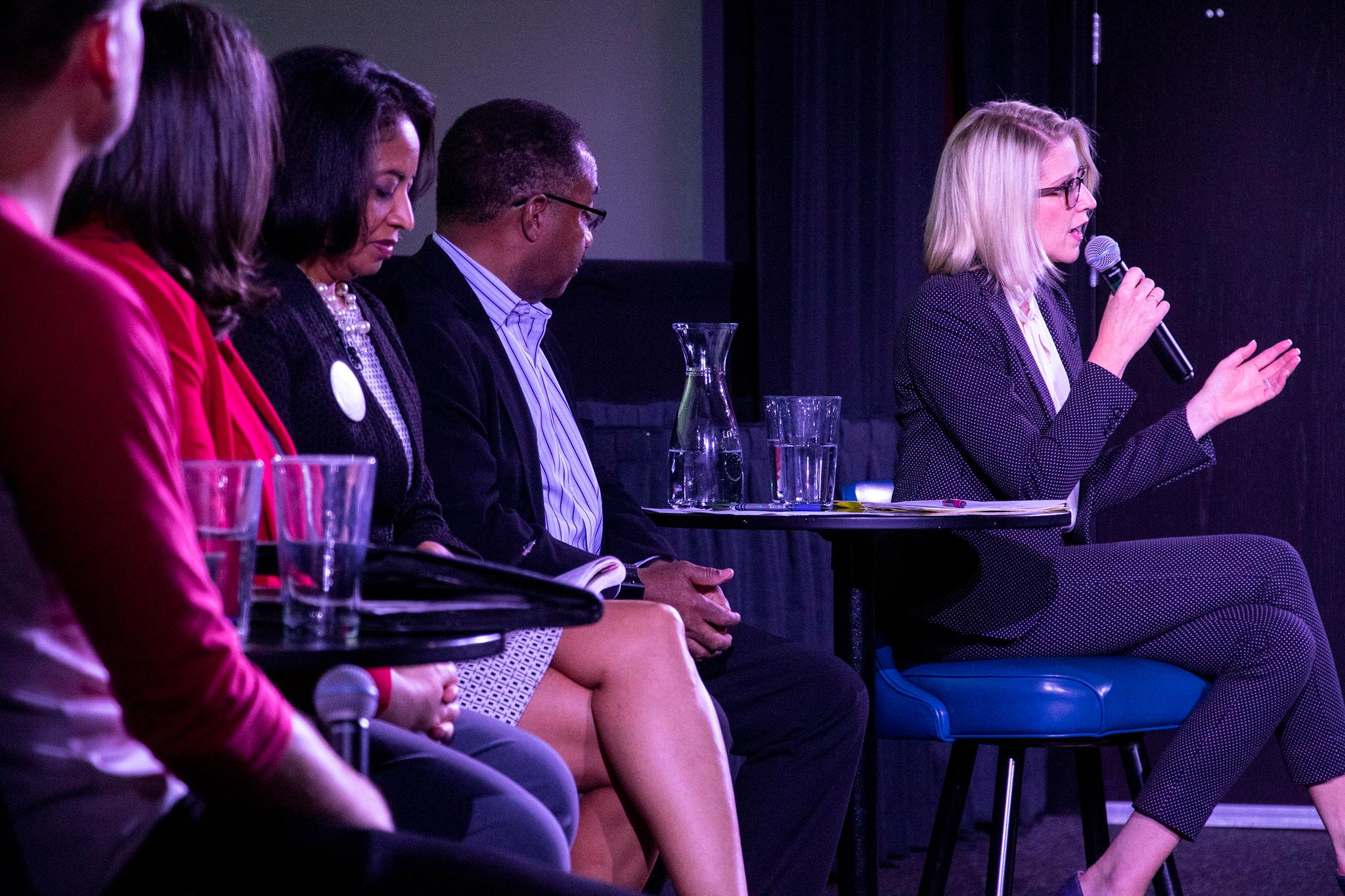Three candidates to be Denver's mayor proposed sanctioned camping sites for people experiencing homelessness.
"We have an immediate need for temporary solutions," Jamie Giellis told an audience assembled by the nonprofit GoodCinema for a documentary and discussion about housing at the Alamo Drafthouse Tuesday. "We need places for people to go where we can get services to them."
Penfield Tate noted that other cities experiencing housing crises have experimented with government-backed camps, some run by nonprofits, of tents or prefab structures where security and social services are provided. He said such sites could be part of a wider plan he envisions that could include using empty school buildings as shelters.
Lisa Calderón didn't address the issue from the stage, but said later such camps could be useful as a path out of homelessness.

April Valdez Villa, a spokeswoman for Mayor Hancock's re-election campaign, said sanctioned camps were something the incumbent would be open to talking about.
Valdez Villa added "the mayor's focus is to connect people with indoor services, including shelter and housing. He often says that he will never be convinced that it's dignified for people to sleep on the street. However he is willing to discuss other options that can play a role in addressing homelessness with a multi-faceted approach to transitional and stable housing."
Hancock was unable to appear at the GoodCinema forum, instead sending his administration's chief housing officer, Britta Fisher.
The discussion about sanctioned camps comes as Denver voters consider an initiative to topple a ban on people sheltering on their own in public spaces. Hancock supports the camping ban targeted by Initiative 300 and opposes the measure, which also is known as the Right to Survive.
Calderón said she is not endorsing any ballot initiative, though she criticized 300's opponents for spending "obscene" amounts of money to defeat it. During the panel discussion, Calderón praised Denver Homeless Out Loud, the advocacy group that gathered petitions to get 300 on the ballot, for its work in areas such as building tiny homes for people experiencing homelessness before Hancock's administration embraced the idea.
Giellis and Tate oppose the camping ban, but say 300 is not the right way to address it. Tate cited the position of the Colorado Coalition for the Homeless, whose vice president of communications and public policy, Cathy Alderman, has said she would prefer City Councilor Hancock withdraw the camping ban the council adopted in 2012, or amend it "in a way that it can't be enforced when people have nowhere else to go."
Addressing homelessness was among a wide range of topics that Calderón, Fisher, Giellis and Tate touched on after a screening of "Owned: A Tale of Two Americas." The documentary explored issues such as redlining that robbed black Americans of the opportunity to build wealth and the targeting of poor people, often minorities, by the predatory lenders who sparked the housing crisis. The film was set in Baltimore, Levittown, Minnesota and southern California. In Denver, panelists said it made clear the need for affirmative action to address the continuing impact of racism and inequality embedded in America's housing history by government policy, corporate action and individual bias.

Tate said lack of affordable housing, "hyper-development" and homelessness "are the biggest issues in the city. Along with roads that are a clogged-up mess."
The Denver panelists brought personal history to the conversation. Fisher described Hancock as having experienced housing insecurity as a child in Denver.
"When I talk whousing with our mayor, he knows what he's talking about," she said. "I feel privileged to work for a mayor who has a heart for this issue."
Fisher spoke of the Hancock administration working with shelters to provide a 24-7 option for people experiencing homelessness. Today, most shelters are only open overnight.
Calderón said, referring to her teen years, said: "I've been homeless as a youth, escaping violence."
The Regis University faculty member went on to earn a bachelor's in English from Metropolitan State University, a master's degree in liberal studies from the University of Denver, a law degree from the University of Colorado and a doctorate in education from CU.
Affordable housing has been central to Calderón's campaign. Tuesday, in answer to a question from the audience, she backed the idea of eliminating single-family zoning. The city council in Minneapolis voted late last year to do so, instead allowing residences like duplexes and triplexes in every neighborhood as part of a broader plan to address racial inequities and its housing crisis.
Tate also supported eliminating single-family zoning.
Fisher said Denveright, a guide for the city's growth, recommends that up to four living units be allowed in areas zoned SU, for single-unit, and that the change would be tied to affordability. She added Denveright also called for accessory dwelling units, sometimes called granny flats, to be allowed in more parts of the city. Both steps would increase density, seen as a way to increase both affordability and walkability in a fast-growing city.
Giellis expressed concern about the possible unintended consequences of eliminating single-family zoning but said she supported efforts now underway in Denver to strike regulations limiting the number of adults who are not related who can live in single-family homes.
GoodCinema spokesman Matt Hargarten said his organization's series on political and social issues was designed to get people to act. Voting was one action he hoped Tuesday's event would spark.
Municipal election ballots began landing in Denver mailboxes this week.













